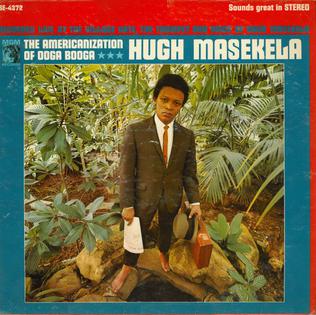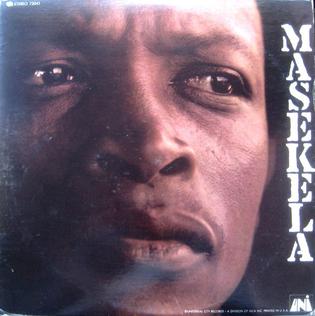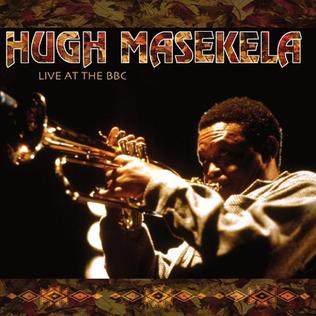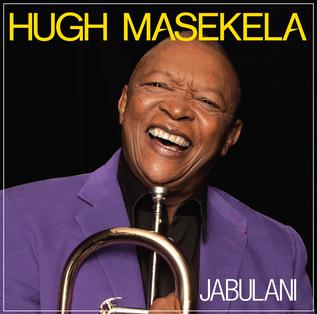
Hugh Ramapolo Masekela was a South African trumpeter, flugelhornist, cornetist, singer and composer who was described as "the father of South African jazz". Masekela was known for his jazz compositions and for writing well-known anti-apartheid songs such as "Soweto Blues" and "Bring Him Back Home". He also had a number-one US pop hit in 1968 with his version of "Grazing in the Grass".

Zenzile Miriam Makeba, nicknamed Mama Africa, was a South African singer, songwriter, actress, and civil rights activist. Associated with musical genres including Afropop, jazz, and world music, she was an advocate against apartheid and white-minority government in South Africa.
"Soweto Blues" is a protest song written by Hugh Masekela and performed by Miriam Makeba. The song is about the Soweto uprising that occurred in 1976, following the decision by the apartheid government of South Africa to make Afrikaans a medium of instruction at school. The uprising was forcefully put down by the police, leading to the death of between 176 and 700 people. The song was released in 1977 as part of Masekela's album You Told Your Mama Not to Worry. The song became a staple at Makeba's live concerts, and is considered a notable example of music in the movement against apartheid.

Trumpet Africaine: The New Beat from South Africa is the debut studio record (LP) by South African musician Hugh Masekela. It was recorded in New York City and released in August 1962 via Mercury Records. The album was released whilst Masekela was still in school.

The Americanization of Ooga Booga is an album by South African jazz trumpeter Hugh Masekela. The album is a blend of American jazz themes and traditional South African musical influences. It was recorded live in November 1965 at The Village Gate night club in New York City and released in June 1966 via MGM Records label. MGM's president was convinced that Masekela's albums were too African for American tastes, so soon after Masekela moved to Chisa/Blue Thumb labels.

The Emancipation of Hugh Masekela is the fifth studio album by South African jazz trumpeter Hugh Masekela. It was recorded in Los Angeles and released in 1966 via Chisa Records label. On this album he performs mostly his own songs. Tracks "Child of the Earth", "Felicidade", and "Ha Lese Le Di Khanna" were later included in his 2004 album Still Grazing.

Masekela is the eleventh studio album by South African jazz trumpeter Hugh Masekela released via Uni Records label in 1969.

Hugh Masekela & The Union of South Africa is the thirteen studio album by South African jazz trumpeter Hugh Masekela released via Chisa Records label in May 1971. The album was re-released on CD in 1994 on MoJazz label.

You Told Your Mama Not to Worry is the twentieth studio album by South African musician Hugh Masekela. It was recorded in Kumasi, Ghana, and released on 9 November 1977 via Casablanca Records label.

Waiting for the Rain is a 1985 studio album by South African jazz trumpeter Hugh Masekela. The album features a constellation of local African stars, most notably Bheki Mseleku on tenor saxophone and keyboards, and includes a cover of Fela Kuti's classic song "Lady". The album is dedicated to his mother, Pauline Bowers Masekela. Many tracks from this album were later included in his 2002 live album Live at the BBC.

Uptownship is a 1989 studio album by South African trumpeter Hugh Masekela. It was recorded in New York City and Jersey City, and released via Novus Records label. This is his last album in exile before the end of apartheid.

Beatin' Aroun de Bush is a 1992 studio album by South African trumpeter Hugh Masekela. It was recorded in Hollywood and released via Novus Records label.

Hope is a 1994 live album by South African jazz trumpeter Hugh Masekela.

Sixty is a 2000 studio album by South African jazz trumpeter Hugh Masekela. It was recorded in Johannesburg, South Africa, and released via the Shanachie label.

Grazing in the Grass: The Best of Hugh Masekela is a 2001 compilation album by South African jazz trumpeter Hugh Masekela. The album was released via the Columbia label. This is a retrospective collection that includes 14 tracks by Masekela.

Time is a 2002 studio album by South African jazz trumpeter, Hugh Masekela. The album was recorded in Johannesburg, South Africa, and released via Sony and Columbia labels.

Live at the BBC is a live album by South African trumpeter Hugh Masekela. It contains the tracks recorded on 23 June 1985 at the Glastonbury Festival in England and on 16 November 1988 at the Nelson Mandela Concert. The album was released on 23 April 2002 via Varèse Sarabande label.

Phola is a studio album by South African jazz trumpeter Hugh Masekela. The record was released on 19 February 2008 via Four Quarters Entertainment label.

Jabulani is a studio album by South African jazz trumpeter Hugh Masekela. The record was released on 31 January 2012 via Listen 2 label in the USA and via Gallo Record Company label in South Africa. The Zulu word jabulani translates as: to be happy, or to bring joy and happiness. Recorded in Pretoria, South Africa, the album is a collection of re-interpreted traditional South African wedding songs.

Rejoice is a collaborative jazz/afrobeat album by Nigerian drummer Tony Allen and South African trumpeter Hugh Masekela. World Circuit released the album on 20 March 2020.



















